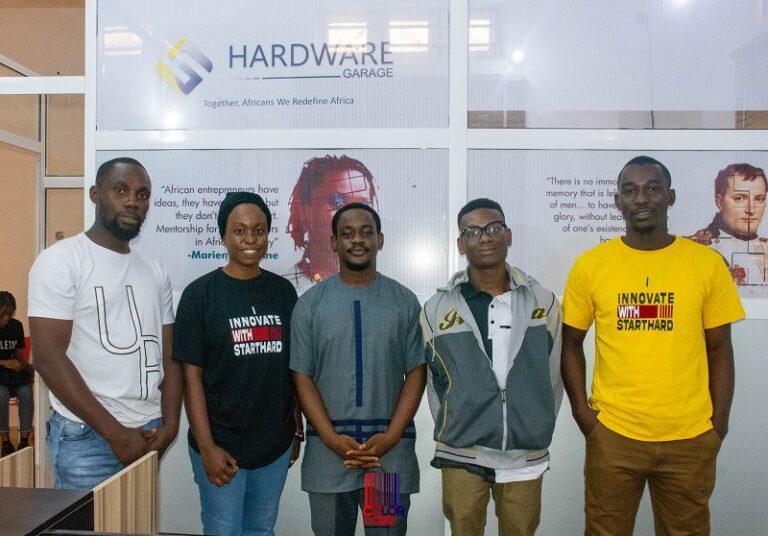Switch Electric: Merging Solar Energy and Innovation with Christwin Jr.

Rejoice Anodo
May 31, 2025

Nigeria suffers from chronic power outages. This occurrence is attributed to the grid collapse. In 2020, a five-member team led by I. Christwin Jr. set out to provide a solution to this problem. The co-founders set up office in Enugu, determined to build a long-lasting solution. They aimed to implement a business model that provides affordable, renewable energy. By 2022, Switch Electric was formalised as an energy-as-a-service (EaaS) company.
Switch Electric’s Business Model
Switch Electric provides decentralised energy solutions. The company sets up the hardware–solar panels, batteries and inverters at no cost to the customers that only purchase the Maxwell prepaid meter (currently priced at ₦20,000). After installation, customers purchase electricity usage (priced per unit) through the Switch mobile app.
As Christwin Jr. stated, “Switch Electric is an energy company, the way you would look at Enugu Electricity Distribution Company (EEDC). We distribute energy in an innovative way, with solar.”
Currently, Switch does not provide energy sales for residential users, as its services are more suited for commercial users. The Maxwell meter is compatible with solar inverters and forms an essential part of the mini power grids set up to trap solar energy.
Switch supports other businesses, rather than just selling energy, with the Metering Protocol, an open-source technology built on Ethereum. “It allows anyone anywhere in the world to leverage the same hardware and the same set of smart contracts we use to provide energy for our users”, Christwin Jr. said.
He further explained that it helps them provide the same services across Nigeria. This includes peer-to-peer energy trading, where energy transactions happen without any intermediary. Confident in their recent development, he confirms, “I know a lot of people can leverage this open source technology and set up their solar infrastructure.”
The Maxwell Smart Meter
Speaking on the challenges faced while building, coupling the Maxwell Smart Meter stood out as a notable challenge. “We worked on it for four years; the software design, its hardware and other technicalities.” The Maxwell Smart Meter is Switch Electric’s unique solution to decentralising renewable energy. The team tried different approaches before settling on the current model.
After successful production, energy sales began in 2024. While developing it, they sensitised customers about its potential uses and carried out solar panel installation (hardware setup). After successfully creating the Smart Meter, they onboarded customers. They received an unprecedented move: demand from companies with similar interests.
Challenges Faced in Business
Through its five-year journey, Switch Electric has created innovative ways to handle challenges. As an early-stage startup, they decided not to pitch to investors until they had a viable product. During this time, funding was mainly bootstrapped. “We are now open to customers and we have started accruing revenue”, Christwin confirmed the result of their decisions.
He explained that other companies are using Switch’s business model, but most of them have pivoted due to similar reasons. “The Energy-as-a-Service niche is quite tricky. You need to understand it well before you take it on. The business requires a lot of capital to purchase the equipment, monetise it and maintain it. When angel investors or venture capitalists provide funding, most companies invest the funds in equipment purchases. Because this is capital-intensive, it takes up almost all the liquidity.
“Not all investors want their equity shares to keep being locked up, and revenue from energy sales is nearly never enough for both business operations and investor profit. In most cases, some companies decide, ‘Why don’t we just start installing solar panels or energy monitoring?’ This is where the pivot comes in, moving their business towards a method that enables more liquidity.”
They avoided this potential problem by proving the authenticity and long-term value of their business model. “We have built solid relationships with our customers and we have proof of the work we put in to get our results”, he affirmed.
Scepticism about the business has often sprung up with customers, driven by fear “that the system won’t deliver”. However, there is a plot twist. “When it eventually does, they demand a purchase, so they can own it. When this happens, we sell and annul the contract.” The company does not run a loss with subscription cancellations.
Christwin opines that most co-founder conflicts occur due to a clash of personal egos, mainly after receiving funding for their startups. As a group of co-founders, Switch’s core team actively avoids co-founder conflict by considering all opinions presented and viewing their work as a constant learning process.
Switch Electric’s Vision for Renewable Energy
Nigeria’s diesel generator use is at an all-time high. Research has proven that over 90% of businesses and 30% of homes have them in constant use. While diesel generators cost less, solar mini-grids are more expensive, but have an impressive lifespan. Christwin Jr. believes solar energy use is here to stay, citing its sustainable approach.
“Generators have a lifecycle of three to five years, whereas solar panels have about 25 years. They are expensive to set up, but their use and maintenance are low-cost. People who have invested in it now will reap its benefits for decades. It solves a major problem for Nigerians, and Switch Electric is focused on making sure this solution lasts.”
The company has expanded operations beyond Nigeria and has focused on regions with similar energy issues and high demand for power, such as Kenya, Latin America, Central Africa, and South America. The CEO revealed that some companies have partnered with them to use The Maxwell Meter. They also plan to set up in Southeast Asia by 2026.
Switch Electric is currently seeking investors. While The Metering Protocol is open-sourced, aimed at disrupting centralised energy distribution, the company wants to scale production of their unique offering: The Maxwell Smart Meter. “We have a more favourable case to present to venture capitalists. It would be less risky to invest in us because we have figured out what we want to sell.”


